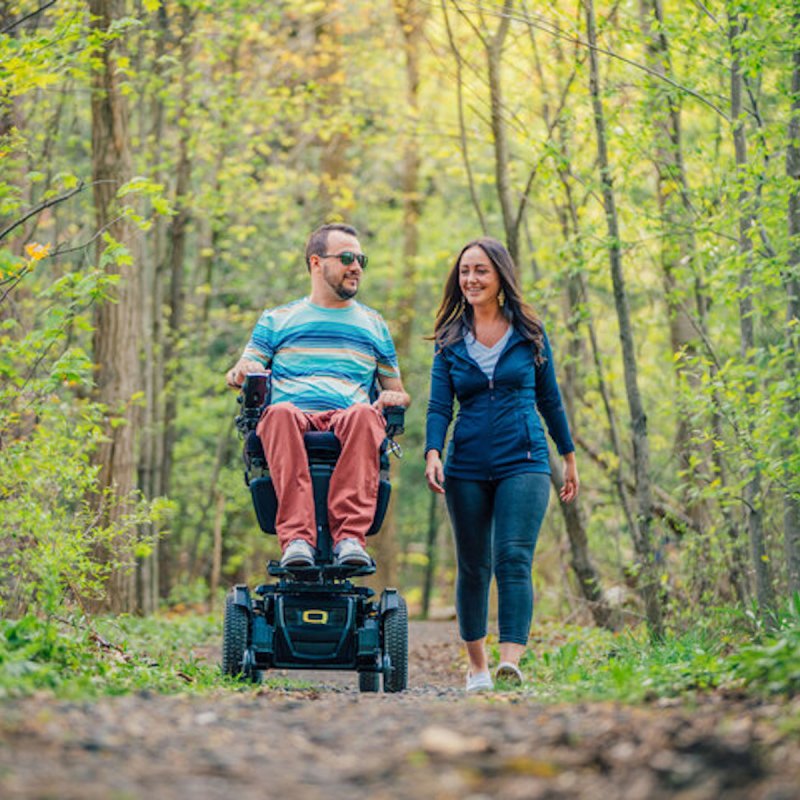
They were real-life superheroes.
Videos by TravelAwaits
The world will always associate Christopher Reeve with Superman; the larger-than-life actor truly seemed to embody the iconic “Man of Steel” persona he portrayed on the big screen. His wife Dana worked tirelessly after Christopher’s 1995 horseback riding accident and resulting spinal cord injury to build a network of support for her husband and millions of others like him. Together, they became activists and advocates, convincing medical specialists to focus on spinal cord injuries, completely committing themselves to finding not just treatments, but possible cures.
The late couple also helped establish what would become the Christopher & Dana Reeve Foundation, and their legacy’s work continues to advance. For more than 40 years, the organization has been funding innovative spinal cord injury research and improving the quality of life for individuals and families impacted by paralysis.
Now, the Foundation is embarking on a new initiative as part of its mission: taking measures to ensure everyone can reap the incredible benefits of nature and outdoor activity. Launched this September during Spinal Cord Injury Awareness Month, the Outdoors for Everyone initiative is a holistic approach to supporting those with disabilities and their caregivers so they can more easily experience the wonders of being in the great outdoors.
“We have always been dedicated to improving the lives of people living with paralysis and their families and caregivers,” explained Mark Bogosian, the Reeve Foundation’s National Paralysis Resource Center (NPRC) director of engagement. “Making sure accessible community spaces are a part of our nation’s fabric is incredibly important to us. So far, we’ve worked on accessible community spaces such as accessible trails, beaches, ballparks, and playgrounds. To us, it’s not just about the accessibility piece, it’s about inclusiveness. Once something’s accessible, you have then made it inclusive. Now everyone can participate.”

The Benefits Of Nature’s Beauty
Time spent in nature can provide an instant, positive attitude adjustment. While most of us know that anecdotally, the American Psychological Association points out it can also improve attention, lower stress levels, and even benefit cognitive function. The outdoors is for everyone.
In a sweeping 2018 study published in the Environmental Research journal, researchers conducted a review of more than 140 previous research projects examining the link between outdoor exposure and health. Their meta-analysis showed getting outside is indeed linked with a whole host of wide-ranging health benefits, including statistically significant reductions in diastolic blood pressure, cortisol levels, and heart rate. Additionally, they found statistically significant decreases in incidences of diabetes and cardiovascular mortality in people who regularly get outside.
But while many of us take a meandering walk in the woods or an energizing stroll on the beach for granted, these activities can be challenging for those living with paralysis, and their caregivers.
That’s where the Reeve Foundation’s Outdoors For Everyone is poised to make a big difference. The initiative aims to act as a bridge between destination partners, including beaches, parks, and natural preserves, and the people served by the Foundation to ensure everyone can reap all the incredible mental and physical benefits nature has to offer — regardless of individual mobility level. The initiative’s focus: working collaboratively and equitably to level the playing field, trail, or recreation area so everyone can get outside.
“It’s really thinking about what else can we do to really make sure these beautiful areas are accessible and enjoyable, so people can fully participate and enjoy them,” said Bogosian.

An Outdoor Action Plan
As part of their action-based campaign, the Reeve Foundation developed a comprehensive plan to help increase both the number — and use — of accessible, or partially accessible, outdoor spaces nationwide.
First, there’s the “Accessible Outdoor Checklist,” which can be used by national, state, and local parks, recreation centers, and other spaces to ensure people living with disabilities are able to enjoy the outdoors safely at their respective locations. The checklist is designed to get those places to proactively think about the things people who use wheelchairs or who live with other mobility challenges need to know or access, from the time they arrive and pull up to park until they head home.
This checklist includes considerations like prominently listing trail length, surface, or slope at a trailhead. It recommends electric charging stations for wheelchairs, accessible rest areas, enhanced ramps, and paved, smooth surfaces. And in the places where there might be obstacles, the Reeve Foundation is ready to offer creative ways to get around them both literally and figuratively.
“We want them to think about everything,” said Bogosian. “We have conversations, share the checklist, talk about what it could potentially look like, and ask ‘what are the barriers?’ What are things that will need to be overcome? We are here to provide them [with] all the information, and what they need to consider when opening an accessible trail, nature area, or botanical garden. We want to help them ensure as many of these things are in place as possible, so they can better provide and serve all the needs of the community.”
While the checklist is designed for the locations to start thinking about accessibility in actionable and achievable ways, the Reeve Foundation’s Information Specialists — simply a phone call away — counsel individuals and their families, informing them of what they should do to prepare before an outdoor excursion so it’s enjoyable, comfortable, and fun for everyone. While Reeve’s Information Specialists are well-versed in this type of support — to date, they have served more than 124,000 people with paralysis or their family members — they are also relying on that partner checklist to help affect real change.
“Many cherished memories of mine involve family outings to nearby parks and state parks, where we engaged in activities such as trail exploration, fishing, and observing animals and birds,” explained Bernadette Mauro, director of Information & Resource Services at the Reeve Foundation. Mauro relies on a mobile wheelchair for daily living. “I’ve realized that one of the most significant challenges revolves around the insufficient information available regarding a park’s accessibility and parking. Inadequate parking not only affects visitors with disabilities but often compels them to abandon their plans and return home. It is my aspiration that parks and trails can effectively utilize the Accessible Outdoor Checklist to significantly enhance accessibility and usability for everyone. Once these resources are in the hands of the parks, the crucial next step is their active utilization to better serve the community.”

Early Wins And Next Steps
While Outdoors For Everyone is in its first year, the plan has already had some big wins. The campaign has secured partnerships with leading outdoor destinations, some being previous Reeve grantee recipients, including the following national parks:
- At Mesa Verde National Park, a Reeve Foundation Direct Effect grant has provided two wheelchair-accessible ramps to the Chapin Mesa Archeological Museum, the only museum in Mesa Verde. The move makes the museum completely accessible to wheelchair users.
- At Glacier National Park, the Foundation is working to fund and help build an accessible trail loop around Swiftcurrent Lake, one of Glacier’s most scenic and beautiful spots, with frequent wildlife sightings.
- Near Rocky Mountain National Park in Colorado, the Foundation is partnering with the group First Descents to fund facilitators, professional rock climbers, and rental vans for a dozen young adults living with multiple sclerosis to participate in rock-climbing outings and programs. First Descents also has an adaptability guide to help individuals determine whether activities like kayaking, climbing, and surfing are possible options.
Nearby in Westchester, a Reeve Foundation grant helped the Westchester Parks Foundation purchase two all-terrain track chairs, allowing people in wheelchairs to traverse the system’s beautiful but often rugged hiking trails.
“They have incredible trails in Westchester, but in some areas you aren’t able to make them accessible because there are rocks, limbs, or roots in the trails,” explained Bogosian. “The all-terrain wheels can go over everything — they’re incredible. We met a gentleman living with paralysis who had previously been a runner on those trails until five years ago, when he was in an automobile accident and became paralyzed. Now, using the track chairs, he’s able to get back on the trails he used to run.”
While Outdoors For Everyone aims high, envisioning accessibility for everyone everywhere, eliminating preventable limitations to those areas is a long-term endeavor. Efforts such as what is taking place in Westchester are celebrated with the hope that they can be replicated on a far larger scale eventually. It will take time, creativity, and collaboration, but for the nearly 5.4 million people in the U.S. living with paralysis, the freedom to explore the great outdoors can’t come soon enough.
“People with disabilities are so often overlooked and not a part of the conversation. They’re not at the table. This is an opportunity to make sure that everyone is being served by elevating the voices and needs of our community and achieving greater representation,” said Bogosian. “Since 1999, the Reeve Foundation has made an investment in accessible trails and community spaces. We’ve invested more than $2 million in accessible beaches, playgrounds, ballfields, and more — this is just the beginning.”
“The overarching goal is that every single national park, state park, or local park has some form of accessible element to it where everybody — the entire family, the entire community — can enjoy,” continued Bogosian. “While it’s not going to happen all at once, we try to make sure that there are specific areas that can provide accessibility. If we break it down piece by piece and focus on out-of-the-box solutions, together we can think creatively with our partners and their communities to open the door to the outdoors for everyone. It’s the right thing to do. The outdoors is for everyone.”
To learn more about the Reeve Foundation’s Outdoors For Everyone campaign, its corresponding checklist, and for more information for individual or family support for people living with paralysis due to spinal cord injuries or other causes, visit the Christopher & Dana Reeve Foundation’s website. Reeve Information Specialists are available Monday through Friday from 9 a.m. ET–8 p.m. at 1-800-539-7309. Individuals can also leave a message if calling after hours.

